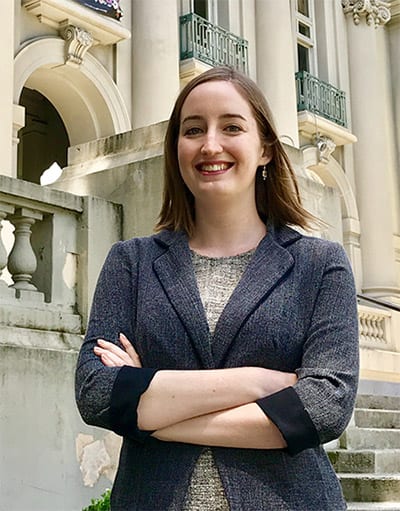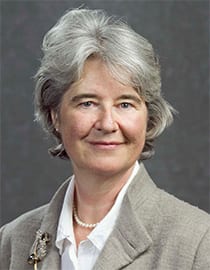By Kirsten Mickelwait

The gender wage gap lives on: In nearly every occupation across the U.S., women are consistently paid less than their male counterparts. In California, women earn only 84 cents for every dollar earned by men, which adds up to a difference of more than $33.6 billion dollars each year. That translates to $322,120 in lost pay over a lifetime for the average Californian woman.
In Berkeley, the situation is even worse: Women here earn only 71 cents on a man’s dollar. But that’s about to change. At its April 4 meeting, the Berkeley City Council voted to approve a recommendation presented by the city’s Commission on the Status of Women to close or reduce the gender pay gap. Heading the commission is Berkeley Law’s Emmaline Campbell ’17, who presented the recommendation to the City Council.
The resolution means that Berkeley will join a select few American cities – including San Francisco, Boston, and Albuquerque – that are working to eliminate gender wage inequality.
Following the incentive-based Albuquerque model, the three-phase recommendation 1) directs city staff to draft an ordinance related to an equal pay vendor preference for city contractors who demonstrate equal pay for male and female employees (with gender based on self-identification); 2) requires the city to complete a salary audit of city employees to investigate potential gender pay gaps within its workforce; and 3) initiates an equal pay certification program for compliant city contractors, which they can use in their promotional materials.
Campbell said that they chose to follow the Albuquerque program because it requires less city time and fewer financial resources to implement. “Other plans require specialized fulltime employees and more complicated procedures,” she said. “With our plan, the contractor simply fills out an Excel spreadsheet and the city just needs to review it, with no municipal economic hardship. For a brand new program like this, it’s important to be self-sustaining.”
The commission is now working with the city to develop an implementation plan and timeline. It will connect city staff with resources, and transfer the knowledge it’s gained by talking to experts around the country.
An early role model at home
Campbell came to Berkeley in 2014 after receiving her bachelor’s degree in Law, Letters, and Society from the University of Chicago, where she wrote her thesis on college sexual assault policies. In her first year at Berkeley Law, she joined UC President Janet Napolitano’s Task Force on Preventing and Responding to Sexual Violence and Sexual Assault. After her first year, she began looking to get involved in broader gender-based issues. So when she learned that the Commission on the Status of Women had a vacancy, she applied. She was appointed to the commission in May 2015 by former Berkeley Mayor Tom Bates.
Such activism is a far cry from Atlanta, Georgia, where Campbell was raised – a region she says is still far behind Berkeley when it comes to women’s rights. She remembers the day in elementary school when the students were each asked to describe what their parents did for a living. Many of the other mothers were homemakers or worked in more traditionally female jobs, but when it came to Campbell’s turn, she proudly announced that her mother, Julia Wallace, had been named the first female editor of The Atlanta Journal-Constitution the year before, in 2002.
“The teacher said, ‘Oh, you must be confused,’” Campbell remembered. “’Maybe she’s the editor of the lifestyle section, but there’s no way she’s the editor of the whole newspaper.’ I said, ‘I really think she is!’ Eventually, probably at the parent teacher conference, it was clarified. But it didn’t faze my mom – this happened all the time.” In 2004, Wallace was named Editor of the Year by Editor & Publisher magazine and she currently holds a chaired professorship at the Walter Cronkite School of Journalism at Arizona State University.
“My mom thought it was really important for my sister and me to see her at work and to be exposed to other women in the work force, following their passions,” Campbell remembered. “At the dinner table, we would talk about things like work-life balance. She would take us with her to community events, and people were always confused to see us there—that she could be both a successful career-woman and a good mother. My dad worked hard to support my mom’s career, and she would always say that supportive partners are critical for women to be able to do this.”
Serving the entire community

Campbell graduates in May with the Class of 2017. In the fall, she will join the San Francisco District Attorney’s office as a post-bar law clerk as she awaits her bar exam results. Campbell said she’d ultimately like to become an assistant district attorney. “I’m more interested in government and public-interest work than politics,” she said. “I want to continue learning about policy-making, practicing in the courtroom, and how the law can better serve the entire community, including women.”
Professor Nancy Lemon, a John and Elizabeth Boalt Lecturer at Berkeley Law, has mentored Campbell in a domestic violence practicum and has kept in touch during Campbell’s law school career. “Emmaline cares deeply about advancing gender equality and the larger issue of achieving justice in our legal system,” said Lemon, a leading authority on domestic violence who pioneered its study in law schools. “I think she’ll make a terrific prosecutor, not just because she’s intelligent and hard-working, but because she has great integrity.”